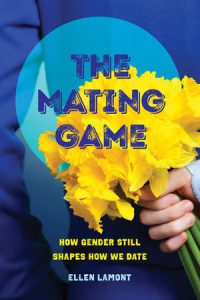 We have seen enormous changes in how people construct relationships in 21st century America. Yet, at the same time, contemporary understandings of romance, desire, and intimacy remain firmly rooted in assumptions of gender difference. In my new book published today, The Mating Game: How Gender Still Shapes How We Date, I explore why, even as we see ever more focus by young adults on building egalitarian relationships, most people want dating and courtship to proceed in gender stereotypical ways.
We have seen enormous changes in how people construct relationships in 21st century America. Yet, at the same time, contemporary understandings of romance, desire, and intimacy remain firmly rooted in assumptions of gender difference. In my new book published today, The Mating Game: How Gender Still Shapes How We Date, I explore why, even as we see ever more focus by young adults on building egalitarian relationships, most people want dating and courtship to proceed in gender stereotypical ways.
I interviewed 105 college-educated young adults in the San Francisco Bay Area about their dating lives and romantic relationships and found the following:
- Heterosexual men and women express a desire for egalitarian relationships, where both partners are educated, have a career, and share the labor at home. But they still continue to crave old-fashioned dating rituals—the man asks for the date, plans the date, and pays for the date. The man asks for commitment and proposes marriage.
- Although these rituals are viewed as romantic, chivalrous, and fun – and of little long-term consequence – they actually lay the foundation for relationship inequality. The result is: Gender inequality gets disguised as romance.
- LGBQ individuals tend to construct more creative relationships by questioning ingrained norms. Their flexibility makes space for more equal relationships in both the short and long term and may offer a potential model or inspiration.
How we date matters. The heterosexual women and men in this study wanted egalitarian relationships and had the educational credentials to meet each other as equals in their households. Yet they did not. Instead, they continue to believe that men and women are innately different. This belief was used to justify (and even celebrate) gendered dating practices, but then spilled over into their long-term committed relationships in less welcome ways. Heterosexual men and women believe that they have different interests, different skills, and different availability for their personal lives. These assumptions of “difference” limit their ability to question and challenge gendered preferences and arrangements. The result is that women end up with the lion’s share of the care work and household labor, in spite of everyone’s professed egalitarian goals.
On the other hand, LGBQ respondents emphasize egalitarian and flexible relationship practices right from the get-go. Payment for dates wasn’t the sole responsibility of one partner, nor was it expected to be. Nor was it the job of just one person to ask for a date. LGBQ people instead focused on communication, negotiation, flexibility, and building balanced relationships that made space for each individual’s often changing needs. This approach had a real effect on the types of relationships they built. Challenging old norms and drawing on new ones didn’t mean they never struggled with problematic relationship practices, but it did give them a different set of tools with which to work, and their relationships were more equal as a result.
The Mating Game is an accessible and engaging read for undergraduate students and general readers interested in gender, families, sexualities, and intimate relationships. The voices of the participants shine through and the empirical questions that drive the work reflect those that readers will often be considering in their own lives. Not only does the book provide readers with the tools to analyze gendered dating practices, it provides a model for how to creatively reimagine our personal lives.
Ellen Lamont is an Assistant Professor of Sociology at Appalachian State University. She can be reached at: lamontec@appstate.edu or on Twitter @EllenCLamont

Comments